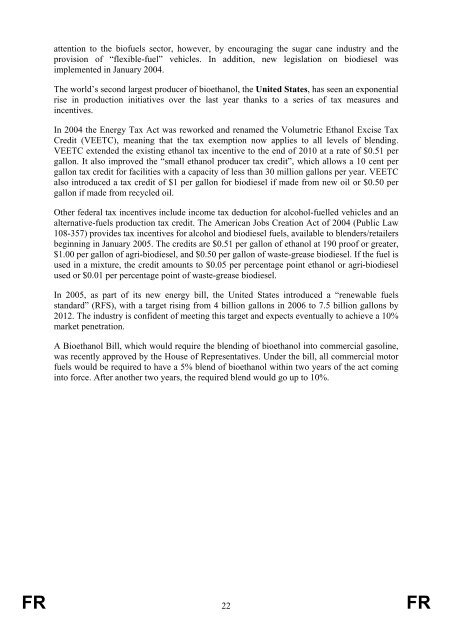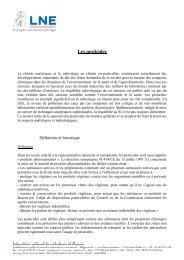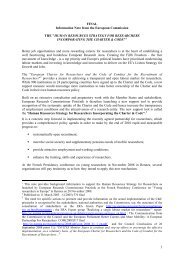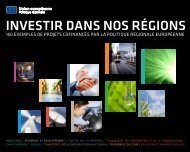FR - Eurosfaire
FR - Eurosfaire
FR - Eurosfaire
Create successful ePaper yourself
Turn your PDF publications into a flip-book with our unique Google optimized e-Paper software.
attention to the biofuels sector, however, by encouraging the sugar cane industry and the<br />
provision of “flexible-fuel” vehicles. In addition, new legislation on biodiesel was<br />
implemented in January 2004.<br />
The world’s second largest producer of bioethanol, the United States, has seen an exponential<br />
rise in production initiatives over the last year thanks to a series of tax measures and<br />
incentives.<br />
In 2004 the Energy Tax Act was reworked and renamed the Volumetric Ethanol Excise Tax<br />
Credit (VEETC), meaning that the tax exemption now applies to all levels of blending.<br />
VEETC extended the existing ethanol tax incentive to the end of 2010 at a rate of $0.51 per<br />
gallon. It also improved the “small ethanol producer tax credit”, which allows a 10 cent per<br />
gallon tax credit for facilities with a capacity of less than 30 million gallons per year. VEETC<br />
also introduced a tax credit of $1 per gallon for biodiesel if made from new oil or $0.50 per<br />
gallon if made from recycled oil.<br />
Other federal tax incentives include income tax deduction for alcohol-fuelled vehicles and an<br />
alternative-fuels production tax credit. The American Jobs Creation Act of 2004 (Public Law<br />
108-357) provides tax incentives for alcohol and biodiesel fuels, available to blenders/retailers<br />
beginning in January 2005. The credits are $0.51 per gallon of ethanol at 190 proof or greater,<br />
$1.00 per gallon of agri-biodiesel, and $0.50 per gallon of waste-grease biodiesel. If the fuel is<br />
used in a mixture, the credit amounts to $0.05 per percentage point ethanol or agri-biodiesel<br />
used or $0.01 per percentage point of waste-grease biodiesel.<br />
In 2005, as part of its new energy bill, the United States introduced a “renewable fuels<br />
standard” (RFS), with a target rising from 4 billion gallons in 2006 to 7.5 billion gallons by<br />
2012. The industry is confident of meeting this target and expects eventually to achieve a 10%<br />
market penetration.<br />
A Bioethanol Bill, which would require the blending of bioethanol into commercial gasoline,<br />
was recently approved by the House of Representatives. Under the bill, all commercial motor<br />
fuels would be required to have a 5% blend of bioethanol within two years of the act coming<br />
into force. After another two years, the required blend would go up to 10%.<br />
<strong>FR</strong> 22 <strong>FR</strong>

















